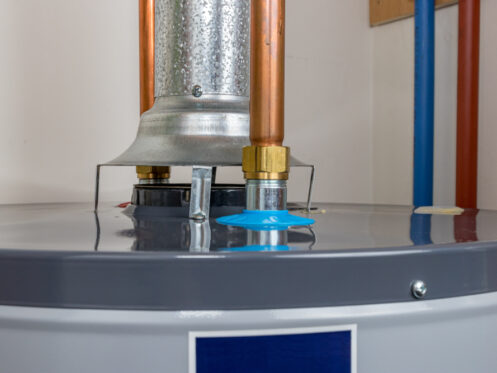Although Denver, CO, typically gets approximately 300 days of sunshine a year, you still want reliable access to hot water for bathing, cooking, and more. Whether you’re building a brand-new house here or planning a water heater upgrade, it’s important to understand the difference between an electric water heater vs. a gas water heater. The experts at High 5 Plumbing, Heating & Cooling can help you understand what makes these water heaters unique so you can choose what’s best for your home and family.
Basics of Gas Water Heaters
Gas water heaters use fuel to heat the water supply in your home. These water heaters burn natural gas or propane (LP or liquid propane). Propane or natural gas and a pilot light ignite a burner under the bottom head and flue to create combustion. The resulting combustion transfers heat to the water through the flue and bottom head of the tank, producing hot water for bathing and showering, cooking, and more.
Basics of Electric Water Heaters
Instead of propane or natural gas, electric water heaters use electricity to heat the water in your home. Cold water enters the tank through your home’s cold water inlet and is warmed up via heating elements powered by electricity. A thermostat monitors the water temperature and controls the heating elements as they turn on or off to maintain your desired temperature. Once the hot water is drawn, more cold water enters the tank, and the cycle repeats.
Key Differences Between Gas and Electric Water Heaters
While the power source is the main difference (using natural gas or propane versus electricity), there are some other key differences when comparing gas vs. electric water heaters.
Installation process
Installing a gas water heater is more complex because it needs a connection to your home’s plumbing and an active gas line. Overall, it’s more expensive upfront to install a new gas water heater than an electric model since more labor and expertise are required. Electric water heaters are easier to install and only need a connection to your home’s plumbing and electrical systems.
Size ranges
Both types of water heaters come in various sizes to meet your household’s hot water needs. Gas water heaters typically come in larger sizes than electric models, so this may be the better choice if you have a large household or use a lot of hot water daily. Most gas water heaters start at around 20 gallons and go to around 200 gallons. Electric water heaters typically go from around six gallons to as large as 50 to 80 gallons.
Safety
Electric water heaters tend to be safer than gas models since there is no risk of a potentially dangerous gas leak. They’re also less likely to cause fires — however, an electrical fire is still possible. Gas water heaters may leak gas due to malfunctioning components or issues with the pilot light, posing a potential safety hazard. We recommend you get regularly scheduled professional inspections to verify that your water heater is still operating safely in your Denver, CO, area home.
Efficiency and Performance Comparison
So, is a gas or electric water heater better when comparing efficiency and performance? Overall, electric water heaters are more efficient than gas models because they don’t require venting to eliminate combustion gases. The need for venting may result in heat loss, causing gas water heaters to operate less efficiently.
The higher Uniform Energy Factor (UEF) of electric water heaters also makes them much more efficient. The UEF refers to the percentage of energy converted into usable hot water. Electric water heaters tend to have UEF ratings of between 0.75 and 0.95, while gas water heaters have average UEF ratings of between 0.5 and 0.7. To maximize efficiency, choose an Energy Star-certified model for optimum performance and energy savings.
Suitability for Different Settings and Regions
When choosing a new water heater, it’s important to consider its suitability based on various settings like your household size and the region where you live. Homes in areas with colder climates may benefit most from a gas water heater since it heats water much faster than electric models. Plus, you’ll still have access to hot water with a gas model if there’s a power outage.
Electric water heaters tend to operate more quietly than gas water heaters but gas models are a better choice when considering usage requirements, particularly if you use a lot of hot water or have a large household. They tend to have larger tanks and cost less to operate long-term because natural gas is less expensive than electricity. If you have a smaller household, an electric water heater might be the better way to go.
Maintenance and Lifespan Differences
Gas water heaters usually require more professional attention when it comes to maintenance. Propane and natural gas models require proper venting and are prone to gas leaks, so scheduling routine inspections is extremely important to maintain safe operation. Both types of water heaters require regular flushing to prevent excess sediment buildup.
The average gas water heater should last between eight and 12 years with proper maintenance. The average electric water heater should last between 10 and 15 years. However, some electric water heaters may have a longer lifespan with the right care.
Need Help With a Water Heater? Contact the Team of Plumbers at High 5 Today!
At High 5, we offer comprehensive, expert plumbing services that focus on what’s needed and the most effective way to do the job. True to our core values, our plumbing company is upfront about pricing, and our prices are affordable. We work hard to earn our customers’ trust and satisfaction in the Denver area and beyond. If you’d like to schedule a plumbing service, water heater repair, or a new water heater installation, contact us today!

